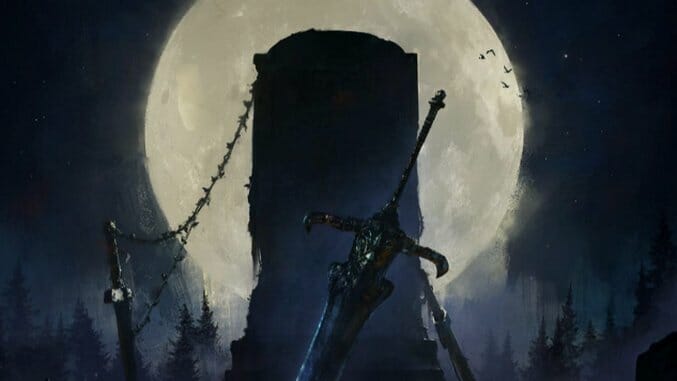
You Died is subtitled as “a Dark Souls companion,” and that little bit of context tells you most of what you need to know about the book in the grand scheme of things. This is a document of the game Dark Souls and, maybe more importantly, the world that Dark Souls has created in its work. Authors Keza MacDonald and Jason Killingsworth (a former games editor for Paste), both formed in the crucible of games reporting and criticism, have made in You Died as comprehensive a document about Dark Souls as one could hope to. And it’s amazing.
The book is composed of alternating chapters that take us into Lordran, the central location of Dark Souls, and into the internet, the place where Dark Souls flourished so beautifully in the days, months, and years after its release. While Hidetaka Miyazaki’s Demon’s Souls, the precursor game to Dark Souls, and its existence as an import sensation and sleeper hit is discussed to a certain degree, the focus here really is on Dark Souls itself and how the world responded to it.
The chapters that take us “into” Lordran are labeled with a funny little “A Tour of Lordran” blobule on the page, as if each was artisanally stamped by a tourism board that wanted you to forget how many controllers were smashed in order to achieve a proper top-down explanation of each area. These chapters are short and sweet, and each is introduced with a quotation from a character in the game tied to the area before Killingsworth narrativizes the goings on in each area. Much like the actual locations, the descriptions often lead to more questions than answers, and at best they are gestures at what seems to be a dreamscape.
The chapters that take us “into” the world of the Dark Souls fandom, development, and critical response are much more concrete and specific. Bearing titles like “Good Grief: Trolls, Invaders, & The Shadow Self” and “Script Keeper: The Making of Dark Souls in English,” the contents of You Died attempt to sketch out the entire weird assemblage of Dark Souls in all of its glory.
On the development side, learn about the translation process, the design of the difficulty, and the logic behind the obtuse summoning system. On the fan community side, we find out why people like Vaati do the lore videos that they do, why challenge runners throw themselves at the game in the way they do, and why those who invade the games of others to kill them do what they do.
All of these perspectives are communicated in an excellent and lively journalistic prose informed by interviews with the subjects, the personal experiences of the authors, and the official and unofficial documents that surround Dark Souls.
You Died leans into the unique weirdness of Dark Souls as an object that needs the internet to survive. The lore videos, the PVP attackers, and the challenge runs all run on an ecosystem afforded by the connectability of players through Reddit, small forums, YouTube, Twitter, and Twitch. While much attention (in a general sense) is paid to the summoning and invasion systems that allow players to interact with one another directly in Dark Souls, it is apparent to any reader of You Died that the unique confluence of all of these channels of communication in gamer culture were absolutely necessary in order to allow Dark Souls the kind of cultural explosion that it has experienced.
You Died is the kind of comprehensive book about a game that, frankly, we haven’t seen before, and in some ways it is the fulfillment of a deep desire that I, personally, have had for quite a few years. There was a time in the nebulous realm of “game criticism” (which, broadly speaking, is writing about games that is not reducible to a buyer’s guide) where many people were concerned about how to get games into the public eye as objects of serious inquiry. While many approaches have been suggested and gestured toward, my feeling was always centered on the book format. “Surely,” I thought years ago, “there must be a way to write about games in a comprehensive and engaging way that could pull anyone into the fold of being intrigued by games as something beyond throwaway toys.”
To be honest, I had given that up. Games criticism has waxed and waned. The blogs of criticism and critical thinking have mostly dried up, with the writers either moving into the space of larger publications to ply their trade (a good end) or being forced into the realm of giving up because of lack of support or interest (the bad, and sadly infinitely more common, end).
And yet You Died has appeared. It’s a shining light. It’s a book that you can give someone to get them interested in Dark Souls. It is not merely a book for the fans, the tragic fate of many books about games, but instead it is a book that might create fans. The world of Dark Souls is so strange and mysterious that to begin walking down the road of Gravelord Nito or Quelaag is to be lured even further down that garden path.
You Died deserves spots on shelves. It deserves to be copied and emulated a hundred times over. Give me fifty more of books with this much heart and serious attention to the micro and macro waves of how games wash over players and bystanders alike.
Cameron Kunzelman tweets at @ckunzelman and writes about games at thiscageisworms.com. His latest game, Epanalepsis, was released last year. It’s available on Steam.